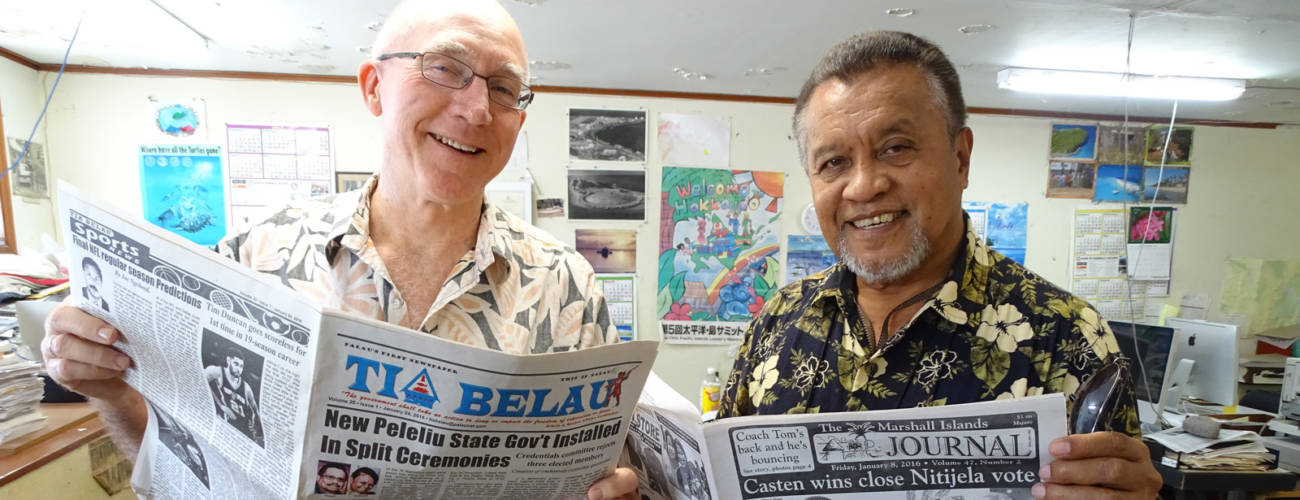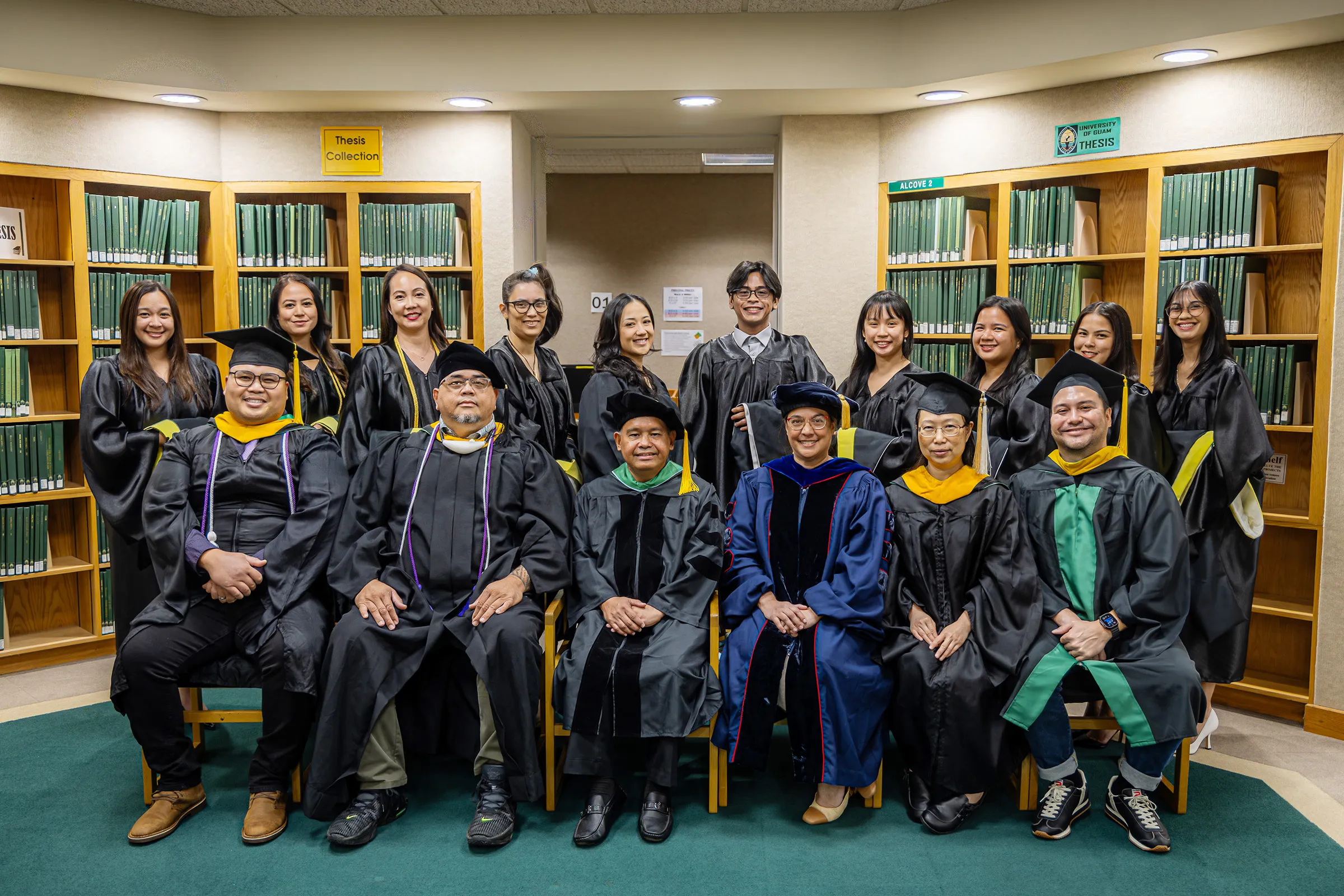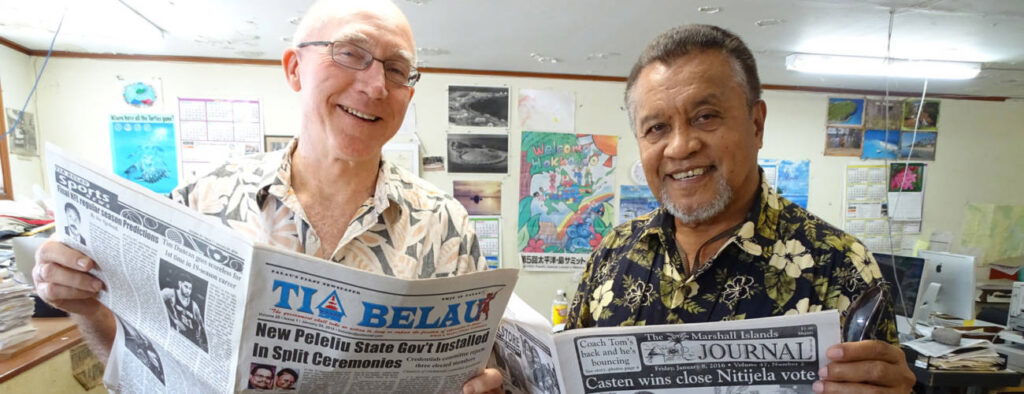<p style=”text-align: center;”><em>ONE of the Micronesian region’s most well-known and most trusted journalists, Giff Johnson of the Marshall Islands is also Marianas Variety’s longest serving correspondent. Here’s his story.</em>

Journal Editor Giff Johnson, left, with Tia Belau Publisher Moses Uludong in the Journal’s newsroom in Majuro.
Q:When did you start writing for Variety?
I first met Variety publisher Abed Younis on my initial visit to Saipan in 1976. At the time, I was engaged in an advocacy role working with the Hawaii-based volunteer group known as the Micronesia Support Committee that was publishing a regular newsletter, producing slide shows about Micronesia-related issues, and producing other publications largely aimed at an American audience. Abed was a must-meet individual and from that initial meeting, we developed an ongoing, long-distance friendship with occasional correspondence by letter. I didn’t get to Saipan too often, but whenever I did visit, a visit with Abed at the Variety office or over a meal was something I looked forward to.
Abed had the vision for the Variety to be a regional publication that would connect the various U.S.-affiliated islands. This led him to start newspapers in Guam and Palau. Because the Marshall Islands Journal was well established and prospering, he didn’t want to compete in that market. Not long after I moved to the Marshall Islands permanently in late 1984 I started covering local news as a reporter for the Journal. Within a few years of my starting at the Journal, Abed encouraged me to correspond for the Variety. The Variety probably first carried my stories from the Marshall Islands in the late 1980s. At the time, fax machines were the most high-tech communications tool available for getting articles transmitted in a timely manner.
Q:How long have you been a reporter/editor?
I started out as a newsletter writer/editor for the Micronesia Support Committee from 1975-1984. During this time, I was also a freelance writer for various magazines. I started as a newspaper reporter with the Marshall Islands Journal in December 1984 and had my first byline story in the paper in the December 28, 1984 edition. By the end of March, 1985 I was named editor of the weekly newspaper, a position I have held since that time except for a couple of periods of about a year in the early- and mid-1990s.

Giff Johnson in the Marshall Islands Journal’s Pressroom. Photo: Dan Zak
Q:Tell us about your job as Marshall Islands Journal editor.
Being editor of a small town community newspaper means you do a little bit of everything. I interview people, take photos, write stories on everything from basketball competitions to debates in the national parliament, proofread and edit the work of reporters on staff, and work with reporters on story ideas. I also assist our advertising staff from time-to-time with clients and billings. After the print edition is complete each week, I do the IT work needed to convert the document into the digital format we use for subscribers. And I often empty my own wastebasket.
Q:Today, anyone with a smartphone and internet connection can be a “reporter” and/or commentator. In your opinion, how can journalism rise above the din?
The main difference between media outlets such as the Variety and the Marshall Islands Journal — or TV or radio news stations — and social media posts is that news reporting goes through a process that generally involves the use of more than one source and fact-checking before a story is issued. From my perspective, it provides a level of legitimacy and assurance to a reader that a research and reporting process has been engaged in that led to the article or news broadcast.
I also appreciate that posts on social, blogs and so forth often provide news organizations, such as the Journal, with tips to be followed up, fact checked and possibly used for later publication.
In addition, social media is helpful to reporters and editors for awareness of trending issues and opinions among members of the public. It can be a helpful feedback loop for media outlets such as ours. So I don’t think too much about an internet “din.” But I do find it helpful to be aware of the trending threads on social media in the Marshall Islands to ensure we are abreast of new issues that may appear on social media first.










